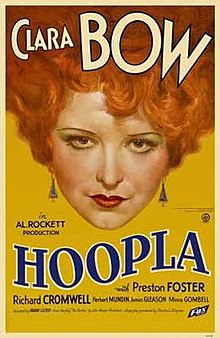Hoop-La is a 1933 American pre-Code drama film directed by Frank Lloyd, and starring Clara Bow (in her final film role), Preston Foster, Richard Cromwell and Minna Gombell also in the cast. The film is based on the play The Barker by Kenyon Nicholson, which was also filmed in 1928 under the same title as the play.
| Hoop-La | |
|---|---|
 | |
| Directed by | Frank Lloyd |
| Screenplay by | Bradley King J.M. March |
| Based on | The Barker by Kenyon Nicholson |
| Starring | Clara Bow Preston Foster Richard Cromwell Minna Gombell |
| Cinematography | Ernest Palmer |
| Music by | Louis De Francesco (uncredited) |
| Distributed by | Fox Film Corporation |
Release date |
|
Running time | 85 minutes |
| Country | United States |
| Language | English |
A version restored by the Museum of Modern Art was shown at the 2011 Classic Film Festival in Hollywood during the spring.[1]
Plot
editWhen the sheltered and educated Chris Miller who is the son of Nifty Miller, manager of a travelling circus, shows up unexpectedly to visit his dad, Nifty wants him to turn around and go back to school. Nifty is reluctant to let him be around the circus folk. However, he is allowed to stay and work for a while; however, this means some things have to change—like Nifty and his paramour Carrie have to cool it for a while. Carrie doesn't take that at all well, and in anger pays worldly Hoochie coochie dancer Lou to seduce Chris and lure him away from his dad. Lou tries her best, and sometimes shocks the naive Chris, like when she goes skinny dipping in a pond.
However, instead of taking him for a chump, she ends up falling in love and comes clean with him; he proposes marriage. Lou thinks she's not good enough for Chris, and so does Nifty. Then Chris and Lou sneak off and get married. Needing money to leave the circus, Lou hits up Carrie for the rest of the money she promised, threatening to tell Nifty if she doesn't pay. They gather enough money to leave, but not before an angry Nifty can throw them out and tell them never to come back. Lou and Chris head for the Chicago and the World's Fair where Lou dances and Chris works in a law office. Having fallen on hard times, Lou secretly arranges for Nifty to be the barker for her dancing act. Lou knows Chris won't be happy until he makes up with his father. Nifty isn't happy; Chris explains that Lou has been making it possible for him to learn the law while she supports them with her dancing. In the end, Nifty realizes Lou is okay and forgives them both.
Cast
edit- Clara Bow as Lou
- Preston Foster as Nifty Miller
- Richard Cromwell as Chris Miller
- Herbert Mundin as Hap Spissel
- James Gleason as Jerry
- Minna Gombell as Carrie
- Roger Imhof as Colonel Gowdy
- Florence Roberts as Ma Benson
unbilled
- Erville Alderson as The Sheriff
- Otis Harlan as Town Councilman, Side Show Customer
- Frank Mills as Barker
- Frank Moran as Side Show Craps Player
- Charles Sellon as The Colonel, Billy's Father
Reception
editThe film was a box office disappointment for Fox.[2]
Remake
editThe same story was remade in 1945 as Billy Rose's Diamond Horseshoe starring Betty Grable.
References
edit- ^ Turner Website TCM 2011 Classic Film Festival
- ^ By, D. W. (November 25, 1934). "TAKING A LOOK AT THE RECORD" New York Times